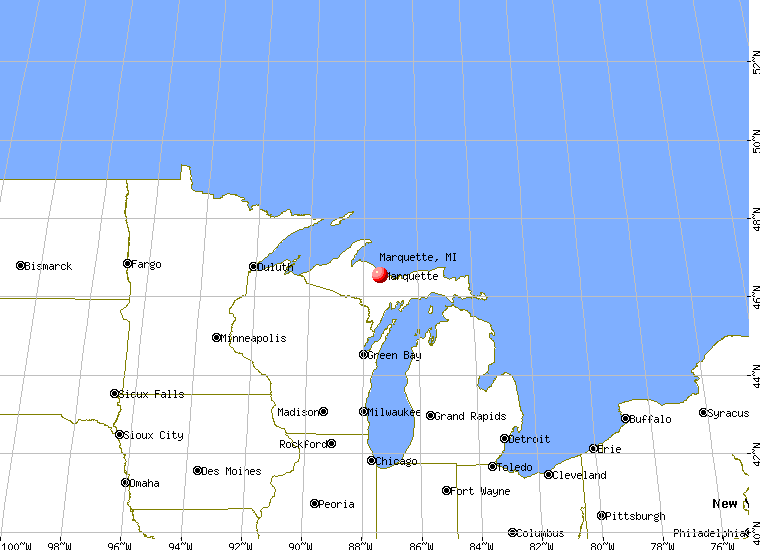I live in Marquette, a small town in Michigan’s Upper
Peninsula. Here is its location on a blurry map:
With a population of 20,000 people, it’s the Upper
Peninsula’s largest city, and also its most culturally-diverse (in that there
are Thai restaurants here).There’s a Norman Rockwellish, downtown with
brick buildings that house bars and cafes and a Food co-op. Three brewpubs. A surprisingly adept system of bike
trails. Lots of parkspace near Lake Superior. People you don’t know will say
hello to you on the sidewalk. You will learn to say hello back.
It takes fifteen minutes to bike from Presque Isle Park to
the Beef-a-Roo and in between is the entire town. Head down Presque Isle
Avenue, past the university, left over to
Third Street, past the grocery store and bike shops and bars, left on
Washington, cut through downtown and coast downhill to Lakeshore and the bike
path and take that the rest of the way out. Ride this any day and you will see
people that you recognize. There’s the lady who wears a parka, no matter the
weather. She shuffles outside of the library with her head turned down. You see
her every day, tottering across Marquette, her eyes locked on the sidewalk, as
if she were very afraid of stepping into a manhole. You do not know her story.
You will probably never know her story.
Or the window-washer downtown. A small man in his seventies;
plaid shirt, newsboy cap. He walks around with a bucket and a squeegee and washes everyone's windows. He works every day. You see him on Sundays. You see
him on holidays. One day, just outside of Donckers, which is an ice cream and
sandwich shop, you have this exchange with him:
WINDOW WASHER MAN: Nice day, huh?
RICHARD HACKLER: Nice day!
WWM: Going to work?
RH: No, going to Doncker’s.
WWM: That’s what I mean!
And he walks away and you do not have the heart to correct
him, so the window washer man will continue to think that you work at
Doncker’s, though you do not work at Doncker’s.
There are others. There’s Theo, sitting on the bench outside
of Dead River Coffee, which he owns. He wears flannel shirts; his face looks
carved out of a treetrunk. Ask him how he’s doing. “Shitty!” he’ll say, and
though you won’t know how to respond, you will like him more because of the exchange.
He sells you green coffee beans, and you roast them in a hot-air popcorn popper
in your kitchen. There’s the English professor, anchoring the end of the bar at
L’attitude with a Don Delillo paperback folded open in front of him. He’s
drinking a martini, holding his glass steadily in front of him, saying
something charming to the pretty bartender who’s planted in front of him with her hand on her hip. His eyes are halfshut, his smile is easy,
and his left hand flits in front of him like a dragonfly. He looks like he’s
casting a spell; he’s a conjurer fueled by gin.
This is your life. This is your whole life, and all of it unfolds within the space covered by a fifteen minute bikeride. And
sometimes this is comforting and sometimes this is suffocating and this is how
it is.
To gauge your current state of mind, do this: ride your bike
seven miles out of town, to Hogback Mountain. This is up county road 550, a
winding two-lane road that dead ends in Big Bay, twenty-five miles away. Lock up your bike and hike
the forty-five minutes to the top. Look around: to your left,
Lake Superior, blue and flat for hundreds of miles, stretching west to Minnesota, north to
Canada. To your right, trees and hills extending to the horizon. And that
little clearing below you? That gray little cluster of buildings hugging the shore? That’s where
you live. Most people live far away, in much larger places. You live down there.
And, in this moment, you will either feel very isolated or
very insulated. You are alone up here, and there is nothing to distract you out
of your head. There is no correcting outside-influence. If you are content, you
will take in the view and feel happier. You will not want the world
encroaching. If you could wish it farther away, you would.
(And this is how it is now. It's summer. There's a farmer's market. The marathon happened today, and the town was full of crossing-guards wearing green vests, helping the runners cross streets. There's a blues-festival going on in Mattson Park, I think. There's a basket full of flowers hanging from each streetlamp. There's some basil growing in planters outside of the Upfront, and no one will stop you if you try pick it. Why would you live anywhere else?)
But if you are unhappy—if you are bored with your job, if you
are breaking up with someone, if you have begun to feel adrift—you will look
around and feel stuck. You will want to badly to flee, to get away for a weekend, but where would you go?
Ishpeming?
And so you’ll bike back into town and you’ll walk along the
lake, in Presque Isle Park, hopping from boulder to boulder. The lake is gray
and churning; the lake is there to fuel your sense of melodrama. You will walk
against the wind, which has chapped your face, which has cut your features
sharp, and this song will be your soundtrack. You live in a region of the
country that is frequently left off of maps. Look out at the water, bleeding into the low sky. This is your life. This is your whole life.

No comments:
Post a Comment